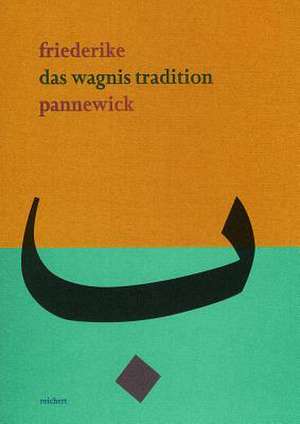Das Wagnis Tradition: Literaturen Im Kontext. Arabisch - Persisch - Turkisch, cartea 2
Autor Friederike Pannewickde Limba Germană Hardback
Din seria Literaturen Im Kontext. Arabisch - Persisch - Turkisch
-
 Preț: 473.93 lei
Preț: 473.93 lei - 19%
 Preț: 445.86 lei
Preț: 445.86 lei -
 Preț: 435.59 lei
Preț: 435.59 lei - 19%
 Preț: 442.29 lei
Preț: 442.29 lei - 19%
 Preț: 551.04 lei
Preț: 551.04 lei - 19%
 Preț: 443.12 lei
Preț: 443.12 lei - 19%
 Preț: 527.47 lei
Preț: 527.47 lei - 19%
 Preț: 534.61 lei
Preț: 534.61 lei - 19%
 Preț: 528.86 lei
Preț: 528.86 lei - 19%
 Preț: 440.13 lei
Preț: 440.13 lei - 23%
 Preț: 529.27 lei
Preț: 529.27 lei -
 Preț: 411.48 lei
Preț: 411.48 lei -
 Preț: 335.83 lei
Preț: 335.83 lei - 23%
 Preț: 741.88 lei
Preț: 741.88 lei - 19%
 Preț: 604.03 lei
Preț: 604.03 lei - 19%
 Preț: 535.30 lei
Preț: 535.30 lei - 19%
 Preț: 442.20 lei
Preț: 442.20 lei -
 Preț: 359.96 lei
Preț: 359.96 lei - 19%
 Preț: 708.05 lei
Preț: 708.05 lei - 19%
 Preț: 525.29 lei
Preț: 525.29 lei - 19%
 Preț: 433.84 lei
Preț: 433.84 lei - 19%
 Preț: 613.36 lei
Preț: 613.36 lei - 19%
 Preț: 613.02 lei
Preț: 613.02 lei - 19%
 Preț: 700.41 lei
Preț: 700.41 lei - 23%
 Preț: 752.51 lei
Preț: 752.51 lei - 19%
 Preț: 613.36 lei
Preț: 613.36 lei - 19%
 Preț: 622.72 lei
Preț: 622.72 lei - 19%
 Preț: 526.26 lei
Preț: 526.26 lei - 19%
 Preț: 707.23 lei
Preț: 707.23 lei - 19%
 Preț: 438.14 lei
Preț: 438.14 lei -
 Preț: 432.67 lei
Preț: 432.67 lei - 19%
 Preț: 442.20 lei
Preț: 442.20 lei -
 Preț: 443.53 lei
Preț: 443.53 lei
Preț: 474.53 lei
Nou
Puncte Express: 712
Preț estimativ în valută:
90.81€ • 94.27$ • 75.72£
90.81€ • 94.27$ • 75.72£
Carte indisponibilă temporar
Doresc să fiu notificat când acest titlu va fi disponibil:
Se trimite...
Preluare comenzi: 021 569.72.76
Specificații
ISBN-13: 9783895001857
ISBN-10: 3895001856
Pagini: 336
Editura: Dr. Ludwig Reichert
Seria Literaturen Im Kontext. Arabisch - Persisch - Turkisch
ISBN-10: 3895001856
Pagini: 336
Editura: Dr. Ludwig Reichert
Seria Literaturen Im Kontext. Arabisch - Persisch - Turkisch
